#stalin's funeral
Explore tagged Tumblr posts
Text
just read through next to stalin: notes of a bodyguard

🥺🥺🥺
#poor molotov. well he outlived beria and khrushchev at least#also klement gottwald/stalin doomed yaoi... he died like a week after the funeral...
11 notes
·
View notes
Text



Sergei Loznitsa, {2019} Государственные похороны (State Funeral)
#film#gif#sergei loznitsa#Государственные похороны#state funeral#stalin#2019#people#corpses#flowers#found footage#archive film#documentary#text#soviet union#death#funerals#colour#male filmmakers#feature length#lithuania#netherlands#2010s
2 notes
·
View notes
Text

...that's not how it looked like in the simpsons
#why is it glowing lmao#watches latest ask a morician's video that ends on a question about how to handle controversial historical artefacts and histories ->#thinks that maybe the nice funeral was too much ->#wonders how other controversial figures were buried ->#remember's mussolini tomb unfortunately ->#realizes she doesn't know where stalin is buried and looks it up ->#''lol what about lenin......AH RIGHT'' ->#realizes she never saw a photo of it ->#this post.#why did I think it was somewhat accurate#I thought it was a simple glass case in a room. obviously not with a giant sign on top of it#more what it looks like when patty and selma visited it#pointless microblogging#I also saw grandma's photo of when she visited moscow and I remember it completely different??? I think I'm mixing up some things#this is the second weird lenin thing post I make surprisingly and hopefully the last one
0 notes
Text
flowers symbolization in the MCR videos (especially red carnations)

so i was looking back at MCR's videos and noticed these flowers. They show up pretty clearly in the last few seconds of the first video. so i thought to do some digging about them since i feel like every tiny detail counts in these videos LMAO. So these flowers are apparently red carnations and baby breath flowers. so i tried to look up symbolization regarding these flowers and found some stuffff
ok so apparently red carnations were worn during International Workers' Day known as May Day, which was a major celebration in the Soviet Union. May Day was a public holiday that celebrated the working class and the achievements of socialism. On this day, people would wear red carnations or carry them in parades and marches. Under Joseph Stalin however, May Day was a major event that showcased its MILITARY power, which is why the guy in the first video kind of looks like he's wearing some sort of military outfit IDK. Also under the Soviet Union, the government often ENFORCED participation in May Day parades to show solidarity and loyalty to the government. That kinda further proves the idea that the Black Parade is kind of being forced to stay in MOAT and show their solidarity to the DRAAG dictatorship. So, under the Soviet Union May Day parades became less against dictatorship (like they originally were) and more about loyalty to government and celebration of socialist achievements under the Soviet Union. I think what's going on in the first video might be some sort of reference to something like a May Day parade, espically with the caption: "His Grand Immortal Dictator wishes to celebrate our rich and storied culture, fine foods, and musical entertainments", this is in short what May Day was about under the Soviet Union. This all would make a lottt of sense. I really do not think this is a coincidence at all and in short, in the first video at least, I think the parade or march or whatever we hear going on outside might be something like a May Day parade.
oh yeah another thing, a popular slogan used during these Mayday parades was "Long Live the Dictatorship of the Proletariat." .... which sounds pretty familar righttt... to "Long Live Draag", which was the in the caption of the first video MCR posted. Another important detail i forgot to mention about the May Day parades is that they were also used as propaganda to showcase soviet power and unity. These parades were highly orchestrated with military demonstrations and symbolic marches. Using this information, it's pretty fair to assume that the "Long Live" Black Parade tour is a form of propaganda for the DRAAG dictatorship. but ok moving on the the white flowers.............
OK SO the white flowers are called "baby breath" and I couldn't find as specific of an example for them, but they generally represent innocence and purity, in some cultures its symbolizes unconditional love butttt they're also commonly used in funeral arrangements, representing eternal love for someone who has passed. This is especially true in Asian and Eastern cultures, where they're commonly used in honoring ceremonies as a symbol of respect and affection.
So, I'm honestly not sure what these two mean together but i really reallllyyyyy doubt that it's a coincidence that they were put together, especially with the symbolization of the red carnations. PLEASE TELL ME YOUR THOUGHTS ABOUT THIS BC I REALLY DONT THINK THE FLORAL ARRANANGMENT IS A COINCEDENCE AT ALLLL i just can't think of what they could mean together. Maybe the contrasting symbolization of the two flowers are significant in some way? idk plsss pls pls pls give me ur thoughts u guys are smart 😭😭😭😭😭
also im just now realizing how long all this is im sorry im so invested LMFAO
#mcr#mcr theory#mcr5 truthing#emo#frank iero#gerard way#mcr tumblr#ray toro#mcr the black parade#mcr5 is real#mcr5#my chemical romance#mikey way#the black parade#epic sauce for sure#draag#long live the black parade#long live draag
77 notes
·
View notes
Text
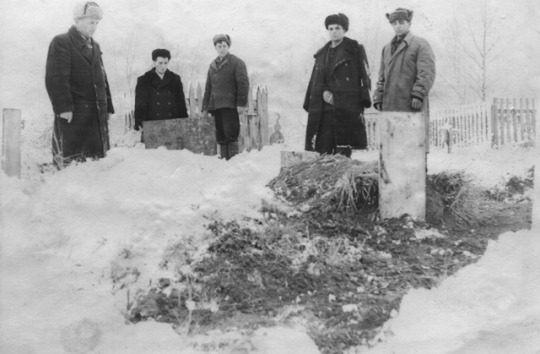
1944: Crimean Tatars hold a funeral in Krasnovishersk, Molotov Region, RSFSR after being deported from their homeland on Stalin's orders in May that year.
Many Tatars did not survive deportation.
#settler colonialism#ethnic cleansing#communism#genocide#communist#colonialism#russian colonialism#russian history#ukrainian history#russia#crimea#ukraine#20th century#1944#1940s#crimean tatars#soviet union#ussr
114 notes
·
View notes
Text
Dmitri Shostakovich at Sergei Prokofiev's funeral, 1953.

For context, Prokofiev and Stalin died on the same day- March 5, 1953. Because Stalin's funeral was such a major event in the Soviet Union, Prokofiev's was largely overlooked, despite the fact he was one of the leading Soviet composers of his day. Relatively few people attended his funeral, Shostakovich among them.
Shostakovich and Prokofiev were not particularly close, and had a thorny professional relationship- much of the correspondence between them that I've been able to find appears to be formal criticism of each other's works. As Prokofiev was from an older generation- he was born in 1891, while Shostakovich was born in 1906- they did not always see eye-to-eye musically; Shostakovich experimented with the avant-garde when possible, perhaps in part due to his musical maturation during the socially-liberal NEP era, while Prokofiev's style tended to be more conservative and neoclassical- picking up more influence from Imperial-age composers and fellow emigres to the west (he lived in France and the United States before returning to the Soviet Union in 1936). Their generational difference also partially accounted for how they responded to harsh government criticism- Shostakovich was impacted by the consequences of his 1936 denunciation all his life and, while he suffered greatly during his second denunciation in 1948, was able to develop public and private personas, in both the musical and ideological spheres, to preserve himself and his artistry. However devastating as it was for Shostakovich, the 1948 denunciations took a greater toll on many other composers, Prokofiev included. As Prokofiev did not believe he would be harshly denounced as Shostakovich had been in 1936, he was far less prepared for the censorship and attacks he faced in 1948. As a result of the denunciations, combined with his declining health, his artistic productivity decreased, and he largely regulated himself to writing basic ideological works towards the end of his life.
This is a letter Shostakovich wrote to Prokofiev on the subject of his Seventh (and last) Symphony:
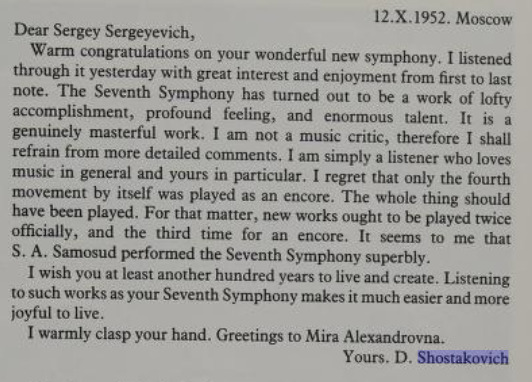
There's speculation as to whether or not Shostakovich was actually impressed by Prokofiev's Seventh Symphony. As Prokofiev was in decline at the time of writing it, the symphony has been criticized for being banal and not being particularly innovative; Rostropovich even claimed that Prokofiev added in its final flourish not for artistic purposes, but to have the piece nominated for a Stalin Prize, which would have meant money and a boost to his reputation after it suffered in 1948. (The Stalin Prize has its own complicated history in its role in Soviet music, and although it was the highest award a Soviet composer could earn, it could sometimes be awarded as a sort of backhanded punishment- an encouragement for composers to write the "right" sort of music, especially after they had been criticized for "formalism." Nonetheless, winning it after suffering a denunciation could mean financial and political security.) Did Shostakovich- who had often traded criticisms with Prokofiev over music- actually like this piece, or was this an effort to encourage a fellow artist to keep composing after suffering mental and physical ailments? This was a private letter and not a public statement, and Shostakovich was typically very straightforward about critiques, so if the entirely positive sentiment for the piece wasn't genuine (the only critique here is that Shostakovich says he wishes the entire symphony was encored!), the letter may have come from a place of concern.
Perhaps the most striking thing about this letter is the line, "I wish you another hundred years to live and create. Listening to such works as your Seventh Symphony makes it much easier and more joyful to live." Maybe by telling Prokofiev that he wished him another hundred years to live and create, Shostakovich was not simply praising the symphony, but encouraging Prokofiev- a composer whom he was often on icy terms with- that he needed to keep living and creating, during a time when it was becoming more and more difficult for him to do so.
#shostakovich#dmitri shostakovich#prokofiev#sergei prokofiev#music history#composers#classical composers#history#soviet history#classical music#music#cw dead body
317 notes
·
View notes
Text
There was a scene in The Death of Stalin where Vasily Stalin crashes his father's funeral reception, spouting nonsense to visiting dignitaries to try and convince them that his death was a conspiracy. "Hairy monsters have scooped out his brain and sent it to America!" He's so excited that you can tell he didn't even practice what he was going to say, he just starts making shit up on the spot. "These traitors are sucking the cocks and balls of zionists—NEW YORK ZIONISTS—New York zionist queers! In petticoats!"
I know this movie is making fun of communism, but like, this is exactly what conservatives sound like today.
"Immigrants are using Jewish space lasers and Cuban energy beams to find and eat your pets at their Chuck E. Cheese sex dungeons!"
It's beyond parody.
14 notes
·
View notes
Note
I am sorry if my English is bad. I didn't understand the mausoleum part of the episode? What kind of a mausoleum would have been socially acceptable? I often get confused on the cultural aspects of the show like this I have never been to a mausoleum but it looked fine to me.
ok someone else asked about logan having a closed-casket funeral so let me bundle these into one answer since they both tell us a lot about logan.
the mausoleum registers as tacky to the kids for a few reasons. first, if you're buying your own mausoleum in a city with no graveyard drainage problems, you're basically announcing that you consider yourself so important you need to, like, erect a monument for your grave. it's braggadocious. in logan's case, connor's probably right that logan didn't want to go underground, which is hard for the kids to think about because it makes them see logan as fallible and afraid, in contrast to the godlike image he always projected with them. second, logan bought it on discount from a dot-com guy, meaning some dipshit tech bubble scammer designed the place for his own aesthetic, and logan essentially just glommed onto it. which is like, not only a memorial to yourself, but one that's not even bespoke. third, it's pink marble and yet somehow simultaneously manages to look sort of tryhard dictatorial ("stalin and liberace"). so, architecturally, it comes off as overcompensatory and flashy, the sort of gauche new money shit that logan was always doing even though he really wanted people to perceive him as classy and dynastic.
basically logan's last impression on the earth is this fancy, overdesigned tomb that registers as accidentally cringey and pathetic to his own kids. it was an extremely expensive purchase by median income standards, yet extremely cheap relative to logan's wealth. it comes off like he half-assed the eternal display of his own body, the thing he always tried to use to telegraph strength and yet also the thing he perceived as failing him as he got sicker. and, with that in mind, i always assumed he would have a closed-casket funeral because he's always considered it humiliating for people to perceive his body as anything other than a powerful tool for doing business. he didn't want to be cared for physically when he was sick because it meant acknowledging that sickness; he hid his scars from his children their entire lives. he wanted to consider himself a rational being freed of all unruly bodily phenomena and illnesses, as he considered these things weaknesses. of course, the kids respond to this in different ways, most notably with connor's cryogenics thing and with roman's fixation on logan's body at the funeral, carrying around his sweaters and advil, and being the only one to visit the body on the plane yet being horrified by connor's photo of it at the funeral home and refusing to walk into the mausoleum.
125 notes
·
View notes
Text
i have only a few critiques of the fabulous and legendary film the death of stalin but i do wish that the movie had alluded to the existence of the other kremlin children (or, in most cases by 1953, kremlin kiddults) and i do think it would have added something to the thematic depth of the movie. like we see khrushchev and molotov's wives but all of these people have wives! they all have children! again, by 1953 they all have grandchildren. and also i do think there's a kind of twisted poignancy in the fact that all of those kids grew up together. there's a picture taken of the real life svetlana standing with anastas mikoyan's oldest son at her father's funeral. idk. armando iannucci where's my stepan mikoyan cameo.
17 notes
·
View notes
Text
youtube
Please enjoy this lovely funeral march in honor of today, the anniversary of Fryderyk Chopin's death (October 17 1849). He wrote the funeral march as one part of a 4-part sonata, and it would become the soundtrack to the some of the most historically significant burials since (like Churchill, JFK, Stalin, or Queen Elizabeth). Though it was played at Chopin's own funeral (kind of epic to write your own funeral march), he didn't ask for it to be (he asked only for Mozart). In fact, he wrote the funeral march 12 years before he died, and though he initially labeled it "marche funèbre" (funeral march in French), he soon scratched out that title and never referred to it as a funeral march again (that we have on record). Why Chopin wrote the world's most recognizable funeral march only to quit calling it a funeral march is one of the great mysteries of the Chopin world.
#music#history#fryderyk chopin#he's on this blog because he was polish#classical music#don't listen to just the beginning or you'll miss the middle trio section considered one of the loveliest pieces of music ever written
24 notes
·
View notes
Text
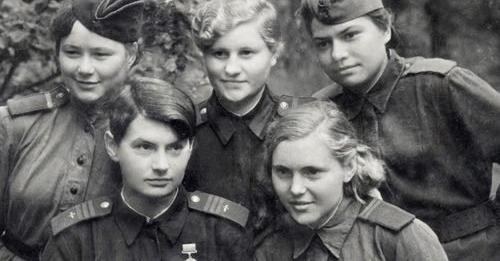
The Night Witches
They didn’t even have parachutes.
The “Night Witches” were a regiment of daring female fighter pilots in the Soviet military who played a crucial role in the Allied victory against Nazi Germany.
The unit was formed by Marina Raskova, aka the “Soviet Amelia Earhart.” Maria was the first female navigator in the Soviet Air Force and held many long-distance flight records. She traveled all over the USSR and everywhere she went, she was approached by women who wanted to fight Nazis. Watching the German aggressors kill their brothers and husbands and destroy their homes and villages made these brave Russian women want to do more for their country than knit sweaters. They were determined to fight.
Marina used her personal contacts to get a message to dictator Joseph Stalin, asking for permission to form a women’s fighting battalion. Stalin immediately issued orders to deploy three all-female air force units and create the all-female 588th Night Bomber Regiment. The women’s mission would not be to drop bombs, but only to return fire. The Soviet Union was the first country to allow women on the front lines of battle.
As soon as the new plan was announced, thousands of women submitted applications for 1200 positions – four hundred for each of the three units. The women ranged in age from 17 to 26, and were mostly students. Those selected for this dangerous job moved to Engels, a small town near Stalingrad, to train at the Engels School of Aviation. There was no time to spare and the women learned in a few months what most airmen take several years to understand. Each woman had to be trained and fully prepared to fill four roles: pilot, navigator, maintenance, and ground crew. They faced mockery and harassment from male soldiers and officers.
The women of the 588th received bargain bin equipment. The military had to outfit them on the sly, giving them hand-me-down male uniforms to wear, including boots that were so large they had to stuff them with rags. Their planes were primitive 20 year old crop dusters made of wood and canvas, providing no shelter from the harsh elements. Flying at night in the Soviet winter, the female aviators endured sub-zero temperatures, fierce winds, and even frostbite. The planes were too light to carry parachutes, radar detectors, radios, or guns. Instead they navigated with low-tech items such as maps, compasses, flashlights, watches, rulers, and pencils – which doubled as eyeliners. They were fierce fighters, but they found ways to add a feminine touch, wearing makeup and putting flowers in their planes.
Each plane could only carry two bombs at a time, one under each wing. Every night, the regiment sent out 40 two-person crews. They flew 8-18 missions each night. The flimsy planes struggled under the heavy load of bombs, and they had to fly at very low altitudes, making them easy to shoot down. This danger is why the 588th Regiment flew only at night.
Each unit had a nightly routine – the first plane would go in as bait to attract German spotlights, which illuminated the path for the other planes. The next plane would release a flare to light up the target. Then the last plane came in, idled its engine and swooped in silently for the kill. Germans called them Nachthexen (night witches) because the whooshing sound their primitive wooden planes made sounded like a sweeping broom. This eerie sound was the only warning Germans had that the fearless women of the 588th were about to attack; the planes were too small to show up on radar.
The Nazis were so threatened by the Night Witches that any German soldier who killed one was automatically awarded the prestigious Iron Cross.
The fearless Night Witches flew over 30,000 missions over the next four years, dropping 23,000 tons of bombs on advancing German armies. They lost 32 pilots including sadly Marina Raskova. She died on January 4, 1943 when her plane was shot down heading to the front line. She received the first state funeral of World War II and her ashes are buried in the Kremlin. Twenty-four of the fliers were honored as “Hero of the Soviet Union.”
For flying into battle with primitive equipment to defeat the Germans, we honor the 1200 brave women of the 588th Night Bomber Regiment, led by as this week’s Thursday Heroes.
30 notes
·
View notes
Text
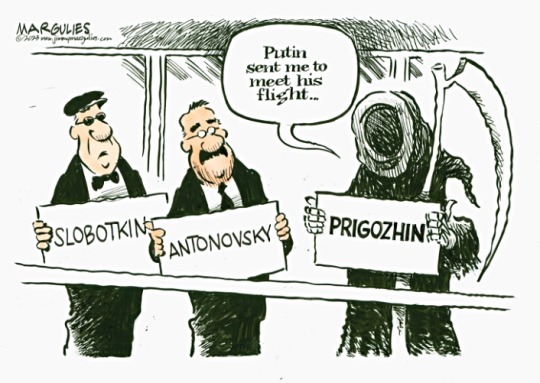
It's difficult to comprehend how stupid Prigozhin was to think that he could still flit around Russia with impunity after his June mutiny. Working with Putin for decades somehow failed to enlighten him on the nature of his boss.
'Message Sent': Russian Elite, Nationalists On Notice After Prigozhin's Presumed Death
I may have some qualms about Wikipedia but I'll readily admit that they are good at compiling lists. This is a particularly useful one.
Suspicious deaths of Russian businesspeople (2022–2023)
Despite the title, it's not limited to people in business – though they do make up the bulk of the names. It includes politicians and anybody who might loosely be considered an opponent of Putin. If I counted correctly, there are 44 names – with Yevgeny Prigozhin and his deputy being the last two. It does not include people who were killed before the start of 2022. This shorter list from Yahoo UK does include several victims killed earlier.
Putin is running his own version of Murder Incorporated out of the Kremlin. The excellent investigative journalism site Bellingcat wrote about a branch of the FSB (successor to the KGB) which is in charge of political hits.
"V" For “Vympel”: FSB’s Secretive Department “V” Behind Assassination Of Georgian Asylum Seeker In Germany
The in-depth article concentrates on one case but there's a lot of information which details overall operations of Putin's murder bureaucracy.
Putin's old day job was a colonel in the KGB. In Soviet times the KGB and its predecessors had a department nicknamed "wet affairs" (мокрые дела) which engaged in assassinations. It engineered the murder of Leon Trotsky in Mexico.
Killing opponents is in Putin's blood. The only differences are that in this century Putin has no qualms about operating inside Russia itself and against supposed opponents who don't directly threaten him. Putin is as paranoid as Stalin.
It's puzzling to consider how Prigozhin probably knew all this but still thought he could go about his business as usual.
One lesson here is that if you are taking action against Putin, don't stop before you've completed it. The June mutiny may have succeeded if Prigozhin didn't get wet feet on the road to Moscow – and it would be Putin who had the most high profile funeral in Russia this year.
#invasion of ukraine#russia is a mafia state#yevgeny prigozhin#the wagner group#vladimir putin#wet affairs#putin's murder bureau#assassinations#fsb#vympel#directorate v#kgb#russians who died under suspicious circumstances#вымпел#Фсб#мокрые дела#кгб#чекисты#евгений пригожин#чвк вагнер#владимир путин#путин – убийца#путин хуйло#россия - террористическая страна#союз постсоветских клептократических ватников#руки прочь от украины!#геть з україни#слава україні!#героям слава!#jimmy margulies
18 notes
·
View notes
Text
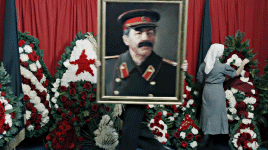
51 notes
·
View notes
Text

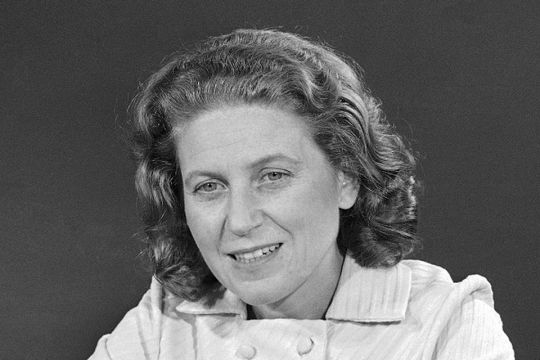
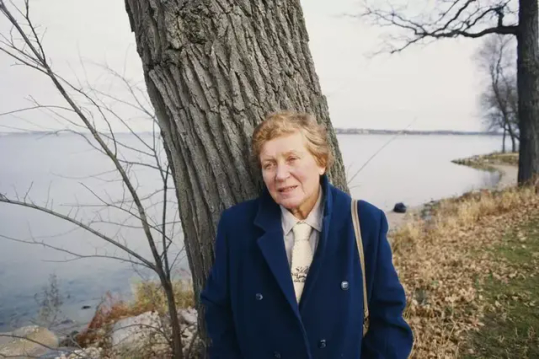

November 22: On this day in 2011, Svetlana Alliluyeva died at the age of 85.
She was born on the 28th of February 1926. Her father was Joseph Stalin, and her mother was Nadezhda Alliluyeva, Stalin's second wife (after Kato Svanidze). She has an older brother named Vasily, and an older half-brother from Stalin's first marriage, named Yakov. Yakov was neglected by Stalin when he was captured by the Nazi soldiers during WWII.
Everything went downhill for Stalin's family life in 1932. Around the early morning of November 9, Nadezhda shot herself with a pistol given to her by her brother, Pavel Alliluyev. This was because she and Stalin had a fight during a party in the Voroshilovs' residence. She was humiliated by Stalin at the table. He called out to her, "Hey you! Why are you not drinking? Have a drink!" to which she responded, "My name is not hey!" and exited. The last person to see her and walk with her was Polina Zhemchuzhina, Vyacheslav Molotov's wife.
Suicide was considered an act of treason in the Soviet Union, so her cause of death was faked. Everyone was told that Nadezhda died of appendicitis. Everyone was fooled, even Svetlana was told about this up until she learned the truth when she was a teenager.
Svetlana was a daddy's girl up until that moment. She attended his funeral in 1953, however.
In 1967, she decided to defect to the United States of America, as well as living a life there. Take note that this was during the Cold War, so the tensions between the USA and the USSR were high.
She lived in the USA as Lana Peters, and she was survived by her daughter Olga Peters, through her marriage with Wesley Peters, as well as her children in the Soviet Union from her previous marriages.
She has written books; her memoirs are entitled "Twenty Letters to a Friend," and "Only One Year."
This is Svetlana's last letter to her daughter, Olga:
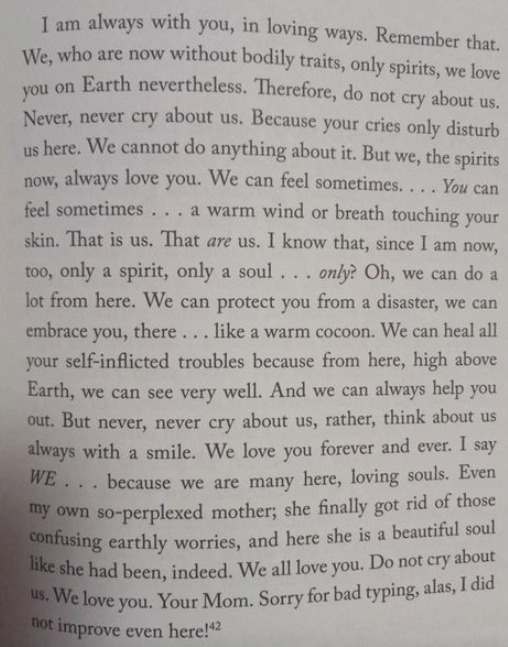
#svetlana alliluyeva#soviet union#ussr#soviet history#history#stalin era#i have waited for so long to post about her#finishing sullivan's stalin's daughter made me cry bc svetlana feels like a friend already#as for nadya i made a literary piece in her memory for a project and i hope i am able to share it with you all!
5 notes
·
View notes
Note
For the WIP ask meme (tysm for the tag), you had me at 'political drama.txt' but I'm also very curious about 'gruffgriff' and Hawke rising from the trash??? Any of those, any combination, or whatever you feel like sharing I will be on like pigeons swarming half a discarded sandwich, pls and thank.
that's really kind of you to say so! 'political drama' is the vaguuuest. there's a lot of arranged marriage fics in fandom and i wanted one that fully leant into the court intrigue angle rather than the romance angle.
i love a particular genre of story that's like, an outsider comes into a poisonous and decadent court and struggles to rise to the top in the hope of reform it/sabotaging it from within against overwhelming odds while also struggling to hold onto their idealism and sense of right vs wrong amidst the scheming and the murdering. at the same time, people are getting dicked down.
this particular .txt is just vague outlines for a proposed series of stories covering the Intrigue, the cyber equivalent of a napkin at a bar with SOTRY: fuckingggggg written on it after a few glasses of your bev of choice. I STILL WANT A COURT INTRIGUE FIC but i have accepted that i would be writing it for an audience of like, five, because people on the whole read arranged marriages for the will they/won't they romance not the actual experience of government, which is a toss up between sausage factory gristle & gore and simultaneously armando iannucci death-of-stalin farce with grown men bickering about the symbolic arrangement of funereal flowers. :sob:
the thing about it was, it had been fun. he had been young and he had been in love and he had wanted, genuinely, to try and change the nature of the fire nation government - to dig deep into the depths of its machinery, pull apart its pistons and boilers and hissing steam valves, its ambition and appetites and pride - but he was a smart man, and at the end of the day, he had been pitting his mind against other smart people, and it had been fun. until (spoiler thing) had happened, and people had died.
"hawke rising from the trash" is one of the published ones! it turned into "a toast to distant friends", a story about varric + hawke's shitty gift choices.
as for gruffgriff, i signed up to a fenris & anders focused big bang a few years ago, somehow failing to realise this was a stupid idea when i don't care much for fenders and that was what a specifically fenris + anders big bang was inevitably gonna feature heavily, and was assigned a pic of the two of them on a gryphon. i took like six different attempts to start a story before giving up and withdrawing from the big bang (mikke wrote a much better story for the same prompt anyway so the artist wasn't left bereft). with this one i think the idea was to have anders having never left the wardens and then for fenris to enter the story in carver's place, having contracted the taint on the deep roads expedition? i kept the opening because i thought it could be used for something else but [laughs bitterly in writer's block].
The cavernous mess hall of the Warden base in the Anderfels could seat, with comfort, almost a thousand people if pressed. Here, within its sandstone walls and under the watchful eye of the First Warden, the Warden-heroes of ages gone had sat and made merry and celebrated victories without counting; had raised toasts to whole legions of the glorious dead before and after battles upon which the fate of Thedas hung; had been filled to the imposing rafters with the sound of an army of men determined to pretend, at least for a little while, that they were not, eventually, functionally, dead men. That the hall currently contained only Anders, Riordan and Stroud was a sad commentary on the state of the Order.
5 notes
·
View notes
Text
This fiction is in remembrance of Alexei Navalny, the martyr.
Heaven On Earth
A bone-chilling wind pulled him back to reality. Alexei realized he was not in heaven but had woken up from a doze due to the cold. After prolonged sleep deprivation, his health was even more miserable than vegetables under freezing rain. He remembered that his most recent memory was of passing out unknowingly a few hours ago, while his cellmate was still struggling with his uncontrollable vocal cords. He tried to sleep on the cold, hard pillow, even though it made every vertebra in his neck painfully aware.
He began to observe his surroundings and realized he was on a vehicle. Where else could I go? he thought, nothing but from one purgatory to another. Was this his trial? Like Khodorkovsky, who spent ten years in prison, changing his perception of time. And what about himself? Had he changed anything... He was no longer afraid of the cold; he no longer needed sleep. The image of Khodorkovsky, a round-headed, sharp-nosed Jew sitting on the train, leaning over to him, saying, "This is not the end of the fight, but the beginning of the real struggle.”
Then Alexei remembered a New Year's Eve many years ago, when he was grabbed and spent the night in jail, surviving on thick socks passed in by a friend, before being dragged to court the next day. These horrific experiences were not unfamiliar to him, just the cold. He had returned from Germany after being poisoned, underwear poisoned, doused in green antiseptic – these trials were like the scars on a knight's face, the medals of valor for the brave, and his armor.
"Oh, today is Christmas." Alexei suddenly realized, hoping this wouldn't mean his team would have to work overtime during the holiday. He laughed to himself, remembering the summer he was transferred to IK-6, how his team panicked when they suddenly lost track of him.
What was the point of it all, what meaning did it all have? he asked himself again. The Slavs lived under the yoke of the Mongols for many years, under the reign of Ivan the Terrible and Stalin for many more years. If there was any difference between the present and history, it could be summed up in a joke: Nicholas I was Genghis Khan with a telegraph, Stalin was Genghis Khan with a telephone... There was never any difference, always anachronistic, always a failure. He certainly wouldn't dream "what if" dreams like a cowardly daydreamer: What if Yeltsin wasn't a damned drunk, what if Putin had fallen early in the metals case, what if the winds of freedom had swept the world. Building happiness in illusions is easy, but that wasn't his mission. The tsar tried hard not to crucify him with his own hands, and for this reason, martyrdom became his fate.
Cold, still cold. Moderate cold makes the mind clear, but excessive cold blurs the line between reality and delusion. He saw his tall friend, the eternal 55-year-old playboy, his soul floating in his prison cell, existing in a form of gas and consciousness. "My dear, I won't be able to attend your funeral, alas! Dear Sakharov Prize laureate... I was actually pondering your future, it's quite simple really, either like me or like Khodorkovsky." Nemtsov waved his hand, "You'll be joining me soon!"
"No, I must find the third way, someone has to finish it."
"I no longer care, ideals only attract the living. Sakharov, ah, Sakharov, I met Boris Yeltsin at Sakharov's funeral, he told someone he wanted a son, to pass on his name Boris. I told someone, I'm also Boris, he's missing a son, and I lacked a father, I felt a father-son bond in my relationship with Yeltsin. You see how much I cared back then. Now, much has changed, but not for the better, fortunately I'm already dead, I don't care anymore, the dead have no principles or mercy."
"Do you know what I'm most afraid of?" Navalny propped up his emaciated head with one hand, like a starved kangaroo. The ghost of Nemtsov raised an eyebrow, waiting for him to continue. "I'm afraid that one day I'll drink gin, numbly watching Putin's propaganda on TV, then shed regretful tears. Then I'd truly become a pitiable and despised beast." Tears rolled in his green eyes.
The ghost of Nemtsov wanted to embrace him but couldn't, he could only try to press his head close to him, "You won't, you won't. Do you know why? Because you're alive, you have humor, you are active thought itself, you are a new story, but they are just imitating the old czarist executioners; you are the story waiting to be told, while they are the forbidden words."
Suddenly, his illusion shattered. A prison guard grabbed his leg, dragging him off the prison van, pulling him along a dim concrete path, and locked him in IK-3, at this point Navalny did not know he would spend his last less than two months of life here. He was still prepared to repeat the request rejected by the previous prison; he wanted a balalaika, he wanted to tell his cellmates he was a black belt in taekwondo, it would be great to have a kangaroo, but in this minus 32-degree environment, he wasn't sure if that counted as animal abuse.
Alexei Navalny, he wasn't good-looking at all, the close set of his eyes, casting shadows in their sockets, made him seem more villainous, but anyway, it was all over, he had left the tsar's cruel Earthly heaven for the real Heaven. Peter Aven once wrote of Berezovsky's life: A man's life story cannot be great without tragedy. This also applied to Navalny's life.
It was an ordinary afternoon at first, the president sitting in front of the crowd with a microphone; the political prisoner walking near the Arctic Circle in winter, then he felt heart-piercing pain, he knocked on Nemtsov's door once again.
And this time, Boris opened the door.
2 notes
·
View notes